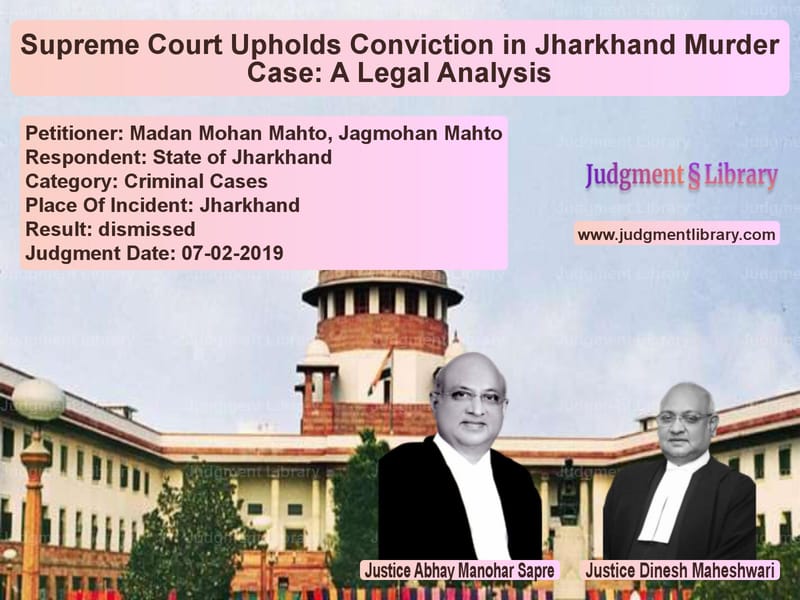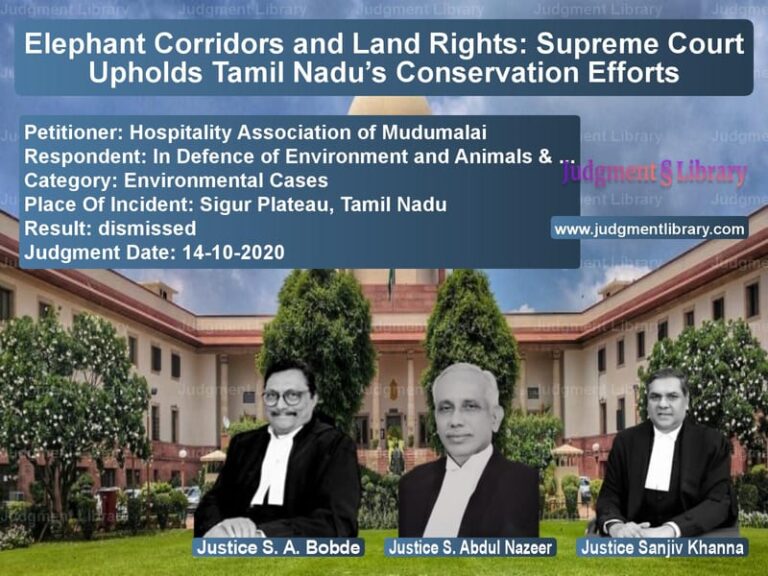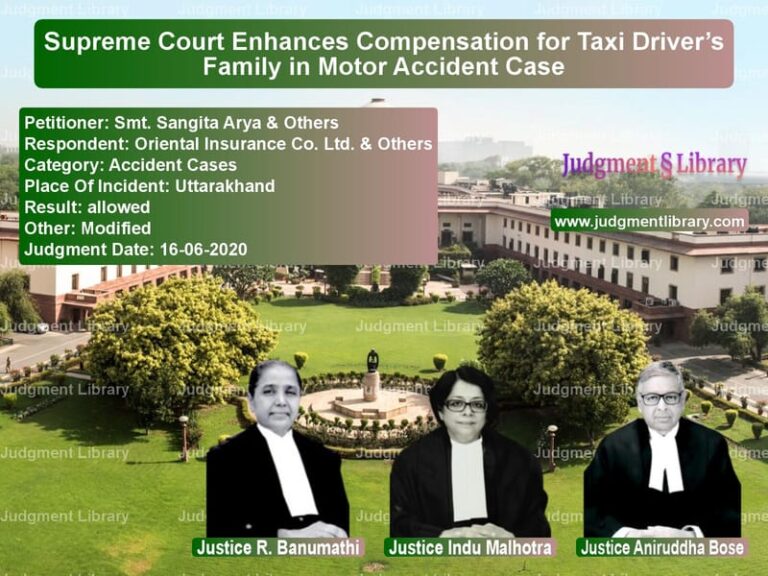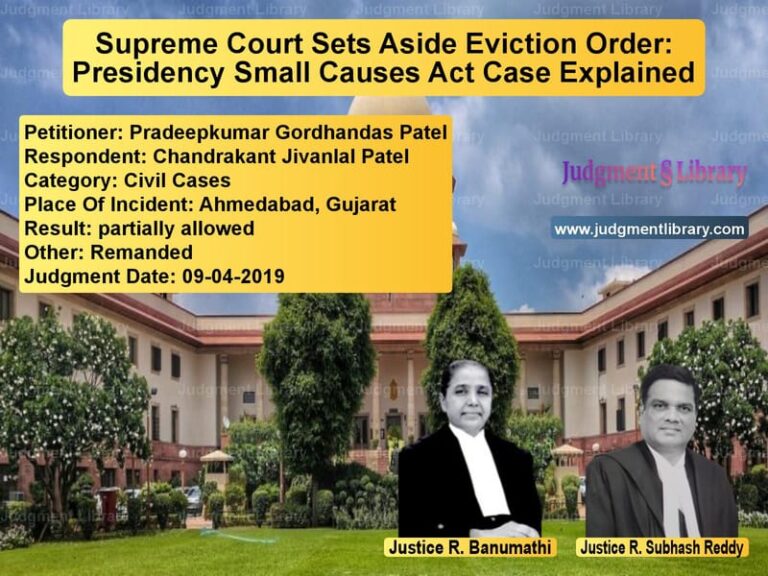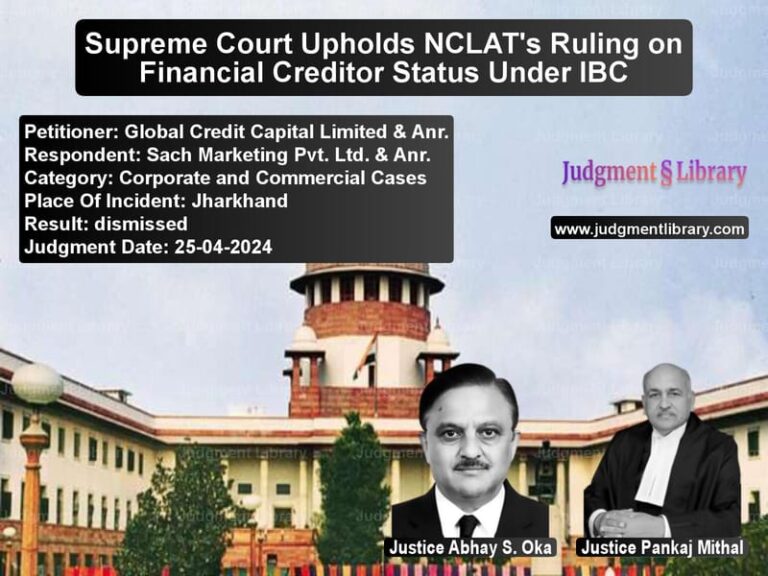Supreme Court Upholds Conviction in Jharkhand Murder Case: A Legal Analysis
The Supreme Court of India recently delivered a significant judgment in the case of Madan Mohan Mahto & Jagmohan Mahto vs. State of Jharkhand. This case pertains to a brutal murder that took place in Jharkhand and involves crucial aspects of criminal law, particularly the application of Section 302 read with Section 34 of the Indian Penal Code (IPC). The Supreme Court upheld the concurrent findings of the lower courts, reaffirming the convictions of the accused and imposing life sentences.
Background of the Case
The case dates back to November 19, 1985, when a murder took place in a paddy field in Jharkhand. According to the prosecution, the appellants, along with two other co-accused, brutally attacked and killed Jitu Mahto while he was harvesting crops in his field. The attack was allegedly driven by a long-standing land dispute.
The First Information Report (FIR) was registered on November 20, 1985, based on a complaint by Kuila Mahto (the informant), who witnessed the crime. The case proceeded through multiple levels of the judicial system, with the Trial Court convicting all four accused and sentencing them to life imprisonment. The High Court of Jharkhand upheld this decision in 2009, leading to the appeal before the Supreme Court.
Key Allegations and Charges
- The accused Madan Mohan Mahto was armed with a gun and fired three shots to intimidate the victims.
- The accused Jagmohan Mahto used a Tangi (axe) to sever the right palm of the deceased.
- The two other co-accused, Bihari Mahto and Charka Mahto, struck the deceased on the head with stones.
- The injuries resulted in the immediate death of Jitu Mahto on the spot.
Trial Court Proceedings
During the trial, the prosecution relied on multiple pieces of evidence, including:
- Eyewitness testimonies from Jagran Mahto (PW-1) and Kuila Mahto (PW-2), both of whom were present at the scene.
- Medical reports and post-mortem findings confirming fatal head injuries consistent with blunt force trauma.
- The history of animosity between the accused and the victim, which established the motive.
Based on the evidence, the Sessions Court convicted all four accused under Section 302 read with Section 34 IPC and sentenced them to life imprisonment.
High Court Proceedings
The accused appealed against their convictions before the Jharkhand High Court. The High Court, after re-examining the evidence, dismissed the appeals on February 3, 2009. The High Court emphasized that the prosecution had proved the case beyond reasonable doubt, relying on:
- Consistent and credible eyewitness testimonies.
- The nature of injuries and forensic evidence.
- The failure of the defense to present any alternate explanation.
Supreme Court’s Analysis and Judgment
The appellants, Madan Mohan Mahto and Jagmohan Mahto, challenged the High Court’s ruling before the Supreme Court, arguing:
- That there were inconsistencies in the prosecution’s case.
- That the eyewitness testimonies were unreliable.
- That the conviction was based on circumstantial evidence rather than direct proof.
However, the Supreme Court dismissed these contentions, stating:
“The two Courts below have appreciated the entire ocular evidence, and this Court would be very slow in exercising its appellate jurisdiction under Article 136 of the Constitution to reassess the evidence afresh unless the appellants are able to point out that the concurrent finding of the two Courts below is wholly perverse or is recorded without any evidence or by misreading or ignoring the material evidence.”
The Court cited previous rulings emphasizing that it is not the function of the Supreme Court to reassess factual findings unless there is a manifest error in the lower courts’ approach. The Court reiterated:
“It is sufficient to say that it is not the function of this Court to reassess the evidence, and an argument on a point of fact which did not prevail with the courts below cannot avail the appellants in this Court.”
Furthermore, the Supreme Court observed that:
- The incident occurred in broad daylight, leaving little room for mistaken identity.
- The presence of multiple eyewitnesses corroborated the prosecution’s case.
- The medical reports confirmed the nature of injuries sustained by the victim.
- Both the trial and appellate courts had thoroughly examined the evidence and found the accused guilty beyond a reasonable doubt.
Final Verdict and Significance
With these observations, the Supreme Court dismissed the appeals and upheld the life imprisonment sentences of Madan Mohan Mahto and Jagmohan Mahto. The Court stated:
“We are unable to notice any kind of infirmity, illegality, or perversity in the approach of the two courts below while holding that the prosecution proved the case beyond reasonable doubt against all the accused persons under Section 302/34 IPC.”
Impact of the Judgment
The Supreme Court’s ruling in this case has reinforced several key principles of criminal jurisprudence:
- Reliability of eyewitness testimony: The Court reaffirmed that credible eyewitness accounts remain a crucial component of criminal trials.
- Consistency in judicial findings: It emphasized that unless there is a clear miscarriage of justice, concurrent findings by lower courts should not be disturbed.
- Importance of motive: The case highlighted how past animosities can establish intent in criminal trials.
- Strict application of life imprisonment: The Court upheld stringent punishment for premeditated murder, setting a precedent for future cases.
Conclusion
The judgment in Madan Mohan Mahto & Jagmohan Mahto vs. State of Jharkhand stands as a crucial ruling in the Indian criminal justice system. By affirming the convictions and upholding the principles of fair trial and consistent judicial findings, the Supreme Court has reinforced the importance of thorough evidence evaluation in cases of murder. This ruling serves as a deterrent against violent crimes and upholds the integrity of the justice system.
Petitioner Name: Madan Mohan Mahto, Jagmohan Mahto.Respondent Name: State of Jharkhand.Judgment By: Justice Abhay Manohar Sapre, Justice Dinesh Maheshwari.Place Of Incident: Jharkhand.Judgment Date: 07-02-2019.
Don’t miss out on the full details! Download the complete judgment in PDF format below and gain valuable insights instantly!
Download Judgment: Madan Mohan Mahto, J vs State of Jharkhand Supreme Court of India Judgment Dated 07-02-2019.pdf
Direct Downlaod Judgment: Direct downlaod this Judgment
See all petitions in Murder Cases
See all petitions in Attempt to Murder Cases
See all petitions in Judgment by Abhay Manohar Sapre
See all petitions in Judgment by Dinesh Maheshwari
See all petitions in dismissed
See all petitions in supreme court of India judgments February 2019
See all petitions in 2019 judgments
See all posts in Criminal Cases Category
See all allowed petitions in Criminal Cases Category
See all Dismissed petitions in Criminal Cases Category
See all partially allowed petitions in Criminal Cases Category

